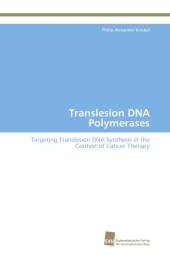 Neuerscheinungen 2011Stand: 2020-01-07 |
Schnellsuche
ISBN/Stichwort/Autor
|
Herderstraße 10
10625 Berlin
Tel.: 030 315 714 16
Fax 030 315 714 14
info@buchspektrum.de |

Philip Alexander Knobel
Translesion DNA Polymerases
Targeting Translesion DNA Synthesis in the Context of Cancer Therapy
Aufl. 2011. 92 S. 220 mm
Verlag/Jahr: SÜDWESTDEUTSCHER VERLAG FÜR HOCHSCHULSCHRIFTEN 2011
ISBN: 3-8381-2052-3 (3838120523)
Neue ISBN: 978-3-8381-2052-2 (9783838120522)
Preis und Lieferzeit: Bitte klicken
While investigating the involvement of REV3, the catalytic subunit of TLS Polymerase zeta (Pol ) in the development of chemotherapy resistance, it was found that inhibition of REV3 expression per se suppresses colony formation of cancer cells whereas normal cells were less affected. It was confirmed that inhibition of REV3 in various cancer cell lines leads to a growth inhibition, due to accumulation of persistent DNA damage, subsequently leading to the activation of the ATM-dependent DNA damage response (DDR) cascade. Inhibition of REV3 in p53-proficient cancer cells results in a G1-arrest and senescence. In contrast, the inhibition of REV3 in p53-deficient or p53-knockout cancer cells results in a growth inhibition and a G2/M-arrest whereas a small fraction of the p53-deficient or p53-knockout cancer cells can overcome the G2/M-arrest, which results in mitotic slippage and aneuploidy. It is shown for the first time that inhibition of a TLS Pol confers synthetic sickness/lethality specifically in cancer cells. The inhibition REV3 per se suppresses cancer cell growth whereas normal cells are less affected, thus identifying REV3 as a potential target for a cancer-specific therapy.
Dissertation and study of Biology at the University of Zurich, Switzerland. Postdoctoral fellow at the Institute for Research in Biomedicine in Barcelona, Spain.


